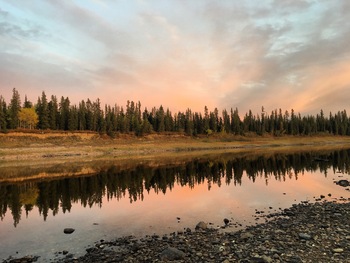This decommissioned ERA site remains active temporarily to support our final migration steps to https://ualberta.scholaris.ca, ERA's new home. All new collections and items, including Spring 2025 theses, are at that site. For assistance, please contact erahelp@ualberta.ca.

- 423 views
- 265 downloads
The Importance of Traditional Knowledge in Freshwater and Fish Monitoring
-
- Author(s) / Creator(s)
-
This picture was taken following a day of fall fishing along the banks of Hay River, one of the culturally significant bodies of water to Kátł‘odeeche First Nation. Initially the community had invited me to travel by boat on Great Slave Lake to one of their traditional fish camps situated at the mouth of Buffalo River. However, earlier that morning an Elder and respected knowledge holder determined that winds on the lake were too strong to safely access the location. Kátł‘odeeche First Nation have occupied their traditional lands in the Northwest Territories’ Dehcho region since time immemorial, where Traditional Knowledge has been passed down through the practice of fish harvesting and monitoring. This Elder’s observations and experiences on the water have identified changes to water quality and levels, which are of growing concerns for the community. My research in collaboration with Kátł‘odeeche First Nation uses interviews to document how Indigenous elders, fish harvesters and youth assess the health of water and fish in the lakes and rivers deemed important by the community. With increasing uncertainty regarding the health of freshwater systems for future generations, it is crucial to understand the importance of Traditional Knowledge in environmental monitoring. // Program of study: MSc // Faculty/Department: Resource Economics & Environmental Sociology // Place of creation: Hay River, Northwest Territories // Award: Semi-Finalist, Images of Research Competition 2019
-
- Date created
- 2019-01-01
-
- Subjects / Keywords
-
- Type of Item
- Image
-
- License
- Attribution 4.0 International